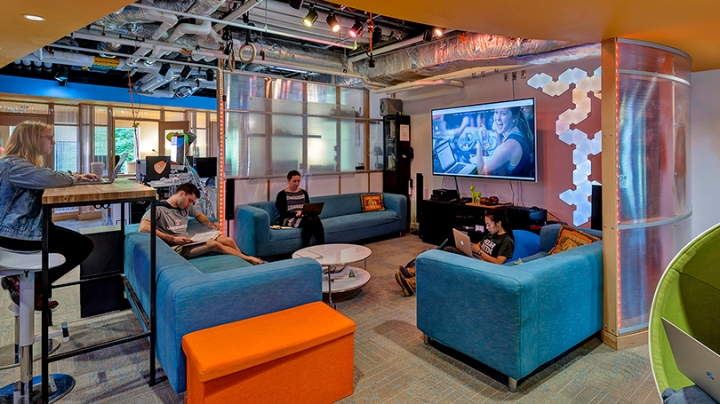Dartmouth’s newly renovated Digital Arts Leadership and Innovation Lab (DALI) has been recognized for design excellence by the New Hampshire chapter of the American Institute of Architects (AIA).
In granting the 2018 citation for a small building designed by a small firm (Studio Nexus Architects and Planners, of White River Junction, Vt.), the AIA jury said, “The open and fluid design reflects DALI’s innovative, high-energy culture and process. Using Salvador Dali’s home, art, and persona (especially his mustache) as a source of inspiration, Studio Nexus developed a state-of-the-art lab that is creative and playful. With an industrial ‘start-up’ sensibility, the space fosters communication, collaboration and the free exchange of ideas.”
Relocated from the first floor to the basement of Sudikoff Lab, the new lab is more spacious than its predecessor, more visually stimulating, and more inviting, say DALI members. The interior space features neon colors, curvilinear glass walls, a compact kitchen, a common area for group brainstorming, smaller, quieter workspaces, playful lighting, and eye-catching furniture, including egg-shaped pod chairs ideal for sequestering from the hubbub.
Doing his homework on a comfy blue sofa, John Kotz ’19 says he spends a lot of time here.
“Earlier today I was hanging out at the conference table and a really interesting conversation started up about self-driving cars—not just the technology, but policy implications,” he says. “But it’s also easy to find places—like that loft over there—where you can do your own work, without totally removing yourself from the group.”
Kotz’s team is creating a computer program for the lab that helps students track their own progress through the sequence of problem-solving projects they undertake for clients in need of technology. “The new space definitely helps our creative process,” he says.
DALI director and co-founder Tim Tregubov says the goal of the redesign was to foster both collective and individual innovation. “Our former lab was OK—there was a central work area, but if you got more than a dozen people in there, communication would degrade to noise and people bumped into each other. Working with Studio Nexus, we involved students in the process of designing a space where they feel welcome and productive, 24-7.”
Almost every structural element in the lab serves more than one purpose, says DALI Executive Director Lorie Loeb, a research professor and director of digital arts. “For example, the columns that needed to be there were turned into white boards where students could draw or make lists. The peninsula in the kitchen can be a work zone or a place to serve up food for lab meetings.” More students than ever are gathering at DALI, especially during open hours on Monday evenings, says Loeb.
“That is the part of the culture we wanted the lab to physically embody, enhancing the Dartmouth students’ experience, and becoming a place they call their own.”
Charlotte Albright can be reached at charlotte.e.albright@dartmouth.edu.
